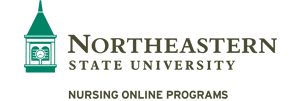Patients must focus on their health while also navigating a complicated healthcare system. They might receive care in different settings from a variety of healthcare professionals, which can lead to confusion and even conflicting information. Because of this, patients might require assistance that goes beyond medical treatment. Nurses at the frontline of care are often called upon to provide that assistance — to effectively serve as patient advocates.
How Are RNs Prepared to Become Patient Advocates?
While a nursing diploma or an associate degree in nursing (ADN) prepares nurses to become patient advocates, a bachelor of science in nursing (BSN) provides nurses with the tools they need to establish and uphold nursing standards or change policies to benefit patients. In other words, diploma- and ADN- RNs who complete their BSN through a bridge program — like Northeastern State University’s RN to BSN online — build on their skills, knowledge and experience to advance their patient advocate competencies and nursing practice.
What Does It Mean to Be a Patient Advocate?
Every RN is a patient advocate. That is because patient advocacy is a fundamental component of the nursing practice. As a patient advocate, nurses provide care, guidance, support and protection.
Patients rely on nurses to explain their diagnoses, prognoses and treatment options in terms that they can easily comprehend. Nurses guide patients who might need advice about how to proceed with a care plan or manage a chronic condition.
In some cases, nurses also comfort and counsel a patient’s family members. They can direct family members to services that can help them cope with the emotional and financial repercussions of their loved one’s illness.
What Does Nursing Competency Mean?
Nursing competency describes a combination of skills, knowledge and ability. All nurses know how to apply their expertise and collaborate with coworkers and other healthcare professionals. Moreover, nurses have the necessary ability to make critical decisions and provide the best possible care. The knowledge gained in RN to BSN program allows nurses to build on these core competencies.
What Are Patient Advocate Competencies for ADN- and BSN-Prepared Nurses?
The Oklahoma Board of Nursing published the Nursing Competencies by Educational Level: Guidelines for Nursing Practice to address questions about nurses’ role in patient care and the common competencies related to their level of educational preparation. RNs work as patient advocates in the following ways:
- ADN-prepared nurses understand the rights of patients, health policy and their responsibilities when planning and delivering care, as well as the importance of intervening when problems arise.
- RNs with BSNs demonstrate all the competencies of ADN-prepared nurses, and they actively engage in developing or changing policies to ensure that patients can participate in, or benefit from, healthcare decisions.
How Can Nurses Be Effective Patient Advocates?
Effective nurses incorporate their core competencies with the ethical standards and legal regulations that govern the healthcare industry. Great patient advocates demonstrate several key traits:
- Accountability
- Commitment
- Empathy
- Flexibility
- Initiative
- Objectivity
- Patience
RNs can continue to grow as advocates by staying up-to-date about patient issues. They might be active in professional nursing organizations or become involved in national discussions about healthcare. Online programs are available for those wishing to advance from an RN to BSN career.
Learn more about Northeastern State University’s RN to BSN online.
Sources:
Nursing2019: Understanding the Nurse’s Role as a Patient Advocate


